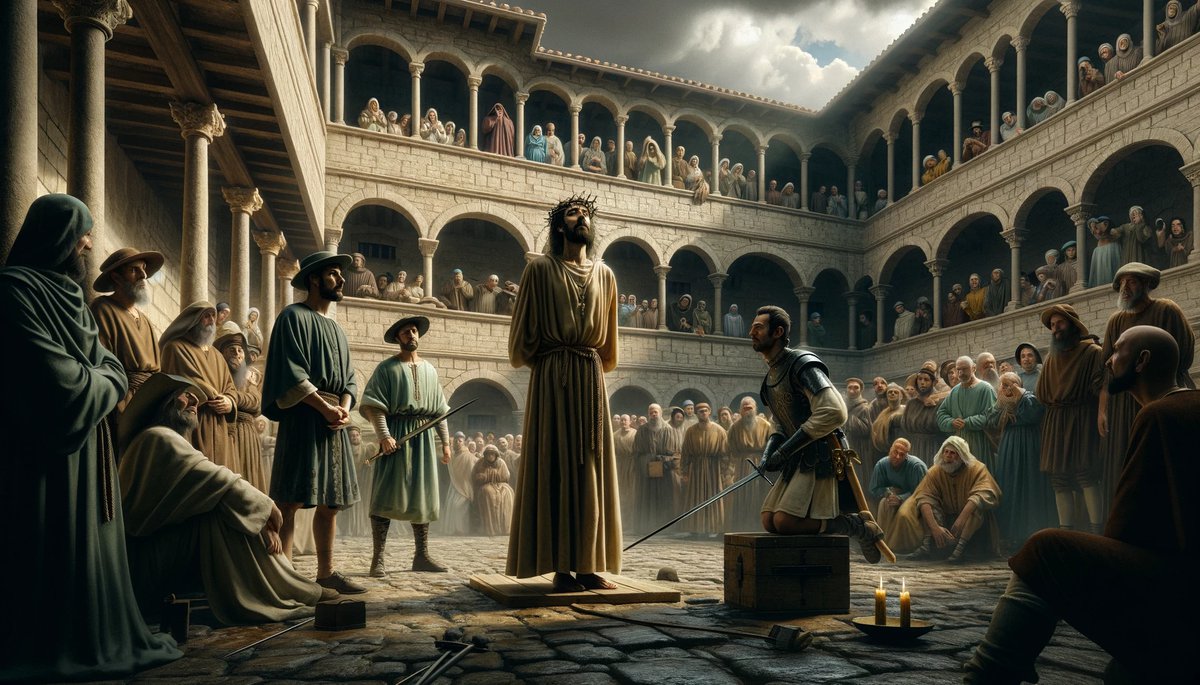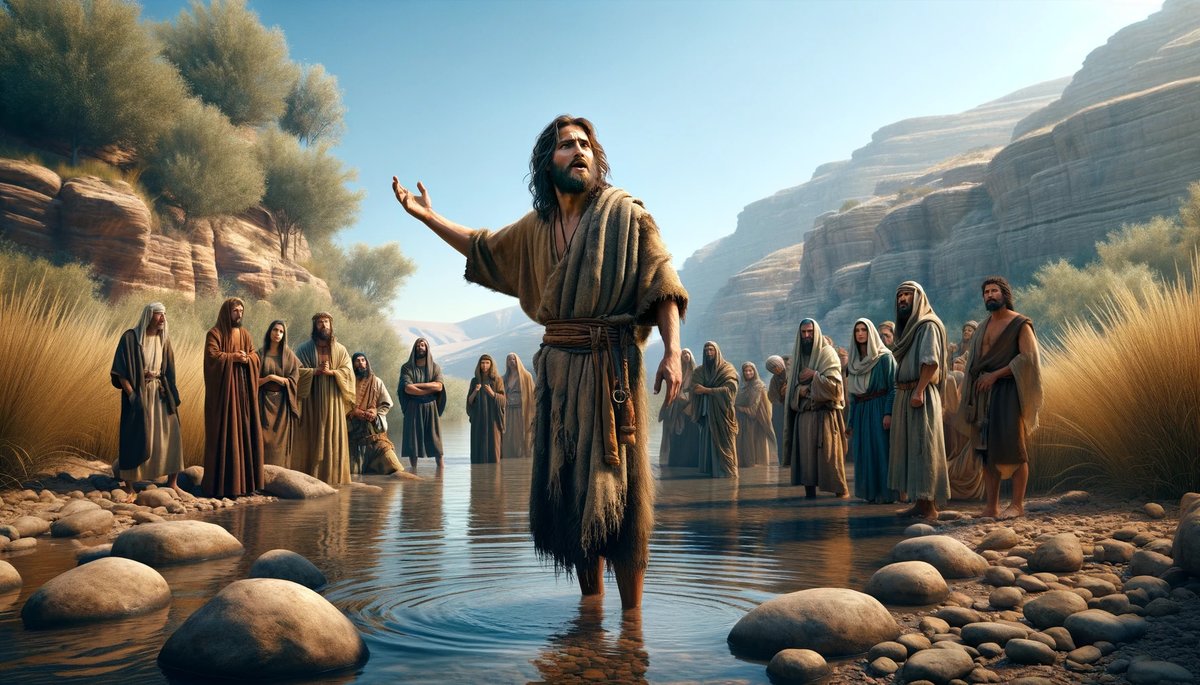Home>Theology and Spirituality>When Did John The Baptist And Jesus Meet


Theology and Spirituality
When Did John The Baptist And Jesus Meet
Published: February 21, 2024
Jason DeRose, Managing Editor at Christian.net, uses his expertise in religion and journalism to deepen understanding of faith's societal impacts. His editorial leadership, coupled with a strong academic background, enriches the platform’s diverse content, earning him recognition in both journalism and religious circles.
Discover the significant encounter between John the Baptist and Jesus in this insightful exploration of theology and spirituality. Gain a deeper understanding of their meeting and its impact.
(Many of the links in this article redirect to a specific reviewed product. Your purchase of these products through affiliate links helps to generate commission for Christian.net, at no extra cost. Learn more)
Table of Contents
Introduction
The meeting of John the Baptist and Jesus is a pivotal moment in the Christian narrative, marking the convergence of two extraordinary figures whose lives and teachings would profoundly impact the course of history. This encounter holds profound significance, not only in the context of their individual roles but also in the broader spiritual and theological framework.
The narratives of John the Baptist and Jesus are intertwined from the very beginning, with their births shrouded in divine purpose and prophecy. Their meeting serves as a symbolic union of the Old Testament prophetic tradition, embodied by John, and the dawning of the New Testament era through the ministry of Jesus. This convergence represents a seamless transition from the preparatory ministry of John to the transformative mission of Jesus, signifying a profound shift in the spiritual landscape.
As we delve into the circumstances surrounding their meeting, it becomes evident that their individual journeys, while distinct, were intricately connected by a shared destiny. The profound impact of their encounter reverberates through the pages of history, shaping the beliefs and practices of countless followers and serving as a cornerstone of Christian faith.
The meeting of John the Baptist and Jesus transcends mere historical chronicles; it embodies the fulfillment of ancient prophecies, the embodiment of divine purpose, and the inauguration of a new covenant. This encounter serves as a testament to the continuity of God's redemptive plan and the seamless progression from anticipation to fulfillment.
In the subsequent sections, we will embark on a profound exploration of the events leading up to their meeting, the significance of their ministries, and the transformative moment when John the Baptist and Jesus converged, forever altering the spiritual landscape. Through this journey, we will unravel the rich tapestry of theological significance and spiritual insight encapsulated within this momentous encounter.
Read more: When Did Jesus And John The Baptist Meet
The Birth of John the Baptist and Jesus
The narratives of John the Baptist and Jesus are intricately intertwined, beginning with the miraculous circumstances surrounding their births. The Gospel accounts depict the extraordinary events leading up to their respective arrivals, underscoring the divine orchestration that heralded their roles in the redemptive narrative.
The birth of John the Baptist was foretold to his father, Zechariah, by an angel of the Lord. Despite the advanced age of both Zechariah and his wife Elizabeth, the angel proclaimed that they would conceive a son who would be named John. This proclamation carried profound significance, as John was destined to fulfill the prophecy of preparing the way for the Messiah, as foretold in the book of Isaiah.
Similarly, the birth of Jesus was foretold through the annunciation to Mary by the angel Gabriel. Mary, a young virgin, was informed that she would conceive a child by the Holy Spirit and give birth to the long-awaited Messiah, who would be named Jesus. This miraculous conception underscored the divine nature of Jesus' mission and his role as the Savior of humanity.
The parallel accounts of these extraordinary births serve as a testament to the divine providence that orchestrated the arrival of John the Baptist and Jesus. Their births were not merely fortuitous events but rather integral components of a meticulously crafted redemptive plan. The convergence of these two remarkable lives was imbued with profound purpose, setting the stage for the fulfillment of ancient prophecies and the unfolding of God's salvific agenda.
The births of John the Baptist and Jesus were marked by divine intervention, culminating in the emergence of two pivotal figures whose destinies would intersect in a profound and transformative manner. These extraordinary beginnings laid the foundation for the ministries of John and Jesus, ultimately leading to the momentous encounter that would forever alter the course of history.
John the Baptist's Ministry
John the Baptist's ministry stands as a testament to unwavering devotion and a resolute commitment to his divine calling. His proclamation in the wilderness of Judea heralded a message of repentance, preparing the hearts of the people for the imminent arrival of the Messiah. Clad in a garment of camel's hair with a leather belt around his waist, John epitomized humility and austerity, drawing parallels to the prophetic traditions of old.
His impassioned exhortations reverberated across the land, beckoning the people to turn away from their transgressions and embrace a life of spiritual renewal. The baptism of repentance that he administered in the Jordan River symbolized a profound cleansing of the soul, a symbolic act of purging the impurities that hindered communion with the divine.
John's ministry transcended mere ritualistic practices; it embodied a profound spiritual awakening, igniting a fervent anticipation for the arrival of the long-awaited Messiah. Multitudes flocked to the wilderness to heed his message, captivated by his uncompromising zeal and unwavering conviction. His proclamation resonated with an authenticity that stirred the depths of the human spirit, compelling individuals to confront their innermost selves and seek reconciliation with God.
In his interactions with the religious authorities of the time, John exhibited unyielding courage, fearlessly challenging the hypocrisy and moral complacency that had permeated the religious establishment. His uncompromising stance on righteousness and his unwavering commitment to truth stood as a beacon of moral clarity in a society fraught with spiritual apathy.
The profound impact of John's ministry reverberated far and wide, transcending social and religious barriers. His message of repentance and spiritual renewal transcended societal distinctions, resonating with the hearts of the common people and influential alike. The transformative power of his ministry lay not in ostentatious displays or eloquent rhetoric but in the profound sincerity and authenticity that characterized his proclamation.
As the precursor to Jesus' ministry, John the Baptist's profound impact on the spiritual landscape set the stage for the momentous encounter that would unfold. His unwavering dedication to his divine mandate and his unrelenting pursuit of righteousness left an indelible imprint on the hearts and minds of all who encountered his message, laying the groundwork for the transformative mission of the Messiah.
The ministry of John the Baptist stands as a testament to the enduring power of authentic faith, unwavering conviction, and a resolute commitment to the divine call. His legacy continues to resonate through the annals of history, serving as an enduring example of wholehearted devotion to the will of God.
Jesus' Ministry
Jesus' ministry represents a profound paradigm shift in the spiritual landscape, characterized by transformative teachings, miraculous demonstrations of divine power, and unwavering compassion for the marginalized and downtrodden. His ministry commenced with the proclamation of the kingdom of God, ushering in a message of radical love, forgiveness, and reconciliation.
Central to Jesus' ministry was his unwavering commitment to the marginalized and disenfranchised. He extended compassion and dignity to those on the fringes of society, challenging societal norms and advocating for the inherent worth of every individual. His interactions with the outcasts, the sick, and the socially marginalized exemplified a revolutionary paradigm of inclusivity and unconditional love.
The teachings of Jesus transcended conventional religious dogma, emphasizing the primacy of love, humility, and selflessness. His parables conveyed profound spiritual truths, inviting listeners to contemplate the deeper realities of the kingdom of God. Through his teachings, Jesus illuminated the path to spiritual enlightenment, calling upon individuals to embrace a radical ethic of love and compassion.
Miracles constituted an integral aspect of Jesus' ministry, serving as tangible demonstrations of divine power and compassion. His miraculous healings, exorcisms, and demonstrations of authority over the natural elements testified to the profound reality of God's kingdom breaking into human existence. These extraordinary manifestations of divine power underscored the transformative nature of Jesus' ministry, offering tangible glimpses of the redemptive power at work.
The confrontations with religious authorities and the fearless denunciation of hypocrisy and spiritual complacency exemplified Jesus' unwavering commitment to truth and righteousness. His uncompromising stance on matters of justice and moral integrity challenged the prevailing religious paradigms, calling for a radical reorientation towards authentic faith and genuine piety.
The culmination of Jesus' ministry found its apex in the sacrificial act of love and redemption upon the cross, where he bore the weight of humanity's transgressions, offering a path to reconciliation and restoration. His resurrection from the dead affirmed the victory over sin and death, inaugurating a new era of hope and redemption for all who would embrace his message.
Jesus' ministry stands as a testament to the transformative power of divine love, compassion, and redemptive grace. His profound teachings, miraculous demonstrations, and sacrificial love continue to resonate through the corridors of time, beckoning humanity to embrace the transformative message of the kingdom of God.
The Baptism of Jesus by John
The baptism of Jesus by John the Baptist stands as a pivotal moment in the unfolding narrative of the Christian faith, encapsulating profound theological significance and symbolic resonance. As Jesus approached the banks of the Jordan River to partake in the baptism administered by John, a transcendent convergence of divine purpose and redemptive fulfillment was set into motion.
The act of baptism, traditionally associated with repentance and spiritual cleansing, took on a profoundly transformative dimension in the context of Jesus' baptism. As John immersed Jesus in the waters of the Jordan River, a sacred exchange unfolded, transcending the outward ritual and delving into the depths of spiritual symbolism. The baptism of Jesus symbolized not a cleansing from personal sin, for he was without sin, but rather an anointing and consecration for his messianic mission.
The Gospel accounts vividly depict the climactic moment following Jesus' baptism, where the heavens were opened, and the Spirit of God descended like a dove, alighting upon him. This divine manifestation bore profound significance, signifying the anointing of Jesus by the Holy Spirit for the commencement of his public ministry. The voice from heaven resounded, declaring, "This is my beloved Son, with whom I am well pleased," affirming the unique filial relationship between Jesus and the Father, and foreshadowing the redemptive mission that lay ahead.
The baptism of Jesus by John served as a transformative threshold, marking the commencement of his public ministry and the manifestation of his messianic identity. This sacred inauguration, characterized by the divine affirmation and anointing, set into motion the unfolding of God's redemptive plan through the life and ministry of Jesus. The convergence of John's preparatory ministry and Jesus' redemptive mission found its symbolic expression in this profound act, signifying the seamless transition from anticipation to fulfillment.
The baptism of Jesus by John reverberates through the annals of Christian theology, encapsulating the profound mystery of the Incarnation and the inauguration of the New Covenant. This sacred event serves as a poignant reminder of the divine confluence of human and divine, the affirmation of Jesus' messianic mission, and the inauguration of a transformative era of redemption and reconciliation.
In the wake of this momentous baptism, Jesus embarked on a transformative journey, embodying the redemptive message of the kingdom of God and extending the boundless grace and love of the Father to all humanity. The sacred waters of the Jordan River bore witness to the profound significance of this divine encounter, heralding the dawn of a new era of hope and salvation for all who would heed the transformative message of the Messiah.
Read more: When Did John The Baptist Live
The Meeting of John the Baptist and Jesus
The meeting of John the Baptist and Jesus stands as a pivotal moment in the tapestry of Christian history, encapsulating profound theological significance and symbolic resonance. The convergence of these two extraordinary figures, each uniquely ordained for their respective roles in the redemptive narrative, heralded a transformative juncture that would forever alter the spiritual landscape.
The encounter between John the Baptist and Jesus unfolded against the backdrop of the Judean wilderness, where John had been fervently proclaiming a message of repentance and preparing the hearts of the people for the imminent arrival of the Messiah. As Jesus approached the banks of the Jordan River, drawn by the stirring call to repentance, a sacred convergence of destinies was set into motion.
In a profound display of humility and reverence, Jesus presented himself to John, expressing his desire to partake in the baptism administered by his prophetic forerunner. Despite John's initial hesitation, recognizing the profound spiritual stature of Jesus, he acquiesced to the divine unfolding, understanding that this sacred encounter transcended conventional norms.
As Jesus descended into the waters of the Jordan River, a transcendent exchange unfolded, transcending the outward ritual and delving into the depths of spiritual symbolism. The baptism of Jesus by John symbolized not a cleansing from personal sin, for he was without sin, but rather an anointing and consecration for his messianic mission.
The Gospel accounts vividly depict the climactic moment following Jesus' baptism, where the heavens were opened, and the Spirit of God descended like a dove, alighting upon him. This divine manifestation bore profound significance, signifying the anointing of Jesus by the Holy Spirit for the commencement of his public ministry. The voice from heaven resounded, declaring, "This is my beloved Son, with whom I am well pleased," affirming the unique filial relationship between Jesus and the Father, and foreshadowing the redemptive mission that lay ahead.
The meeting of John the Baptist and Jesus served as a transformative threshold, marking the commencement of Jesus' public ministry and the manifestation of his messianic identity. This sacred inauguration, characterized by the divine affirmation and anointing, set into motion the unfolding of God's redemptive plan through the life and ministry of Jesus. The convergence of John's preparatory ministry and Jesus' redemptive mission found its symbolic expression in this profound act, signifying the seamless transition from anticipation to fulfillment.
In the wake of this momentous encounter, Jesus embarked on a transformative journey, embodying the redemptive message of the kingdom of God and extending the boundless grace and love of the Father to all humanity. The sacred waters of the Jordan River bore witness to the profound significance of this divine convergence, heralding the dawn of a new era of hope and salvation for all who would heed the transformative message of the Messiah.
This meeting of John the Baptist and Jesus transcends mere historical chronicles; it embodies the fulfillment of ancient prophecies, the embodiment of divine purpose, and the inauguration of a new covenant. This encounter serves as a testament to the continuity of God's redemptive plan and the seamless progression from anticipation to fulfillment.
Conclusion
The meeting of John the Baptist and Jesus stands as a profound testament to the seamless continuity of God's redemptive plan and the convergence of divine destinies. From the miraculous circumstances surrounding their births to the transformative encounter at the banks of the Jordan River, the narratives of John and Jesus intertwine to form a rich tapestry of theological significance and spiritual resonance.
The convergence of John the Baptist and Jesus heralded a transformative juncture in the unfolding narrative of the Christian faith, marking the seamless transition from anticipation to fulfillment. Their individual ministries, characterized by unwavering devotion, radical proclamation, and transformative compassion, set the stage for the momentous encounter that would forever alter the spiritual landscape.
The baptism of Jesus by John served as a sacred inauguration, signifying the commencement of Jesus' public ministry and the manifestation of his messianic identity. The divine affirmation and anointing that accompanied this sacred exchange bore profound significance, setting into motion the unfolding of God's redemptive plan through the life and ministry of Jesus.
The meeting of John the Baptist and Jesus transcends mere historical chronicles; it embodies the fulfillment of ancient prophecies, the embodiment of divine purpose, and the inauguration of a new covenant. This encounter serves as a testament to the continuity of God's redemptive plan and the seamless progression from anticipation to fulfillment.
As we reflect on the convergence of these two extraordinary figures, we are invited to contemplate the profound theological significance encapsulated within this transformative encounter. The meeting of John the Baptist and Jesus serves as a poignant reminder of the divine orchestration that undergirds human history, weaving together the threads of prophecy, fulfillment, and redemption.
The narratives of John the Baptist and Jesus converge not merely as historical chronicles but as enduring symbols of divine providence and redemptive grace. Their meeting stands as a testament to the enduring power of faith, the transformative nature of divine encounters, and the seamless continuity of God's redemptive narrative.
In the annals of Christian history, the meeting of John the Baptist and Jesus remains an indelible testament to the profound intertwining of human and divine destinies, encapsulating the timeless truth that the fulfillment of ancient prophecies and the inauguration of transformative eras are intricately woven into the fabric of human existence.














